Clive on Abarat: Days of Magic, Nights of War
..."We're at the very edge of things, Henry. Nothing's certain after this." She caught hold of his hand.
"Except love."
"Are you afraid?" he said
"For us? No. But for these people - these poor, confused people who don't believe that their lives have the least meaning - yes, I'm
afraid for them."
"Afraid they're going to die?"
"Worse than that. Afraid the end will come and they'll be in terror, because they won't believe they have a heaven to go to."
"Maybe they're right," Henry said bluntly. "I mean, this a cruel world. And I doubt the Abarat's much better. What is there to believe
in, when you come down to it?"...
"Henry Murkitt," she said. "Listen to yourself, you damn fool! Anybody can shrug and say life is just some accident of mud and
lightning. But Henry, it isn't. And I mean to show you, in the time we have together - whether it's an hour or a day or
whatever it is - I mean to show you that you just have to open your heart and look - you hear me, look! - and you'll
see every minute a hundred reasons to believe... Don't you see we're born into a pattern so huge and beautiful and so full of
meaning we can only hope to understand a tiny part of it in the seventy or eighty years we live with breath in our bodies? But one
day, it will all come clear. And on that day I'd like to be standing right beside you and saying - "
They spoke the rest together:
"I told you so!"...
"I'm writing [book 2] right now, and it's incredible fun. In some ways, writing the second book has been more fun than writing the first book, because in the first book I was finding a style and finding a rhythm and now with the second one, I'm going back to this world, back to these characters and it's just - this is not an exaggeration - this is my 20th book, I don't think I've ever had so much fun writing a book as I have writing Abarat 2... and I'm also laying out the plot for Abarat 3 as I'm finishing up the second book."
Once Upon A World...
By Amy Cox Williams, Children's Advance, October 2002.
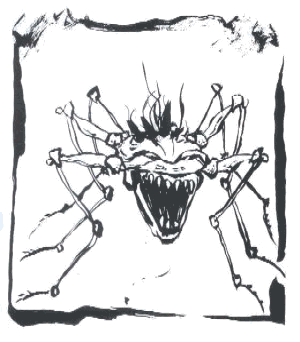
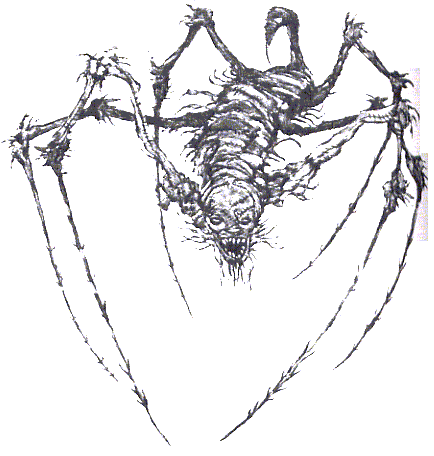
"I wrote the book, finished the book in November [2003], read the book and didn't like it and threw it all away, the whole thing, and
began again - which I've never done before. So there's nothing in the second volume of Abarat as it now stands which faintly resembles that first version...
"It is a 600 page manuscript, the first book, and there's nothing - there's names in common, but the islands that are visited are different, everything is pretty
different. And it came from a profound desire, on my part, not to... I realised the book was teasing people, my first version was teasing people too much. There
wasn't enough delivery as I saw it and I wanted the second book to give you a genuine sense of fulfilment. After all, you will have been through almost a quarter of
a million words and 250 illustrations. You should have a sense of... emotional payback. There should be a sense that some of the storylines have reached some
genuine conclusion and I felt that the story wasn't taking
the readers far enough, it wasn't giving us enough of a journey to enough of a conclusion to something big enough. And so I thought I don't think this is right or fair.
I need to go back and I need to start again and I need to configure this. I want it to go to a much bigger place in terms of narrative, in terms of emotion and in
terms of fulfilment of the narrative promises in the first book.
"I don't want this to be a three-book tease with a one-book pay-off, I want each of the books to
pay off some of the narratives and present other strands which are going to grow in complexity and richness and obviously go on. But I think at the end of the
second book, and this is certainly what I'm getting back from people who have read it, there's a real sense of, 'oh we went somewhere, we got somewhere, we
were delivered somewhere, we got closure.' There are significant deaths in this book, there are significant changes in this book, there are significant revelations
in this book. So... and I'm not saying that there wouldn't have been some of those in the first version, but they wouldn't have been as satisfying, I think.
I'm much, much happier with the second book. And so, it was worth it! But that was the other reason why it's taken longer to get here and there have been certain
times when I've regretted it... but now, having got there, I don't regret it at all - I think it was the right thing to do."
Abarat: 2B (Or Not 2A)...
By Phil and Sarah Stokes, 22 July 2003 (note - full text here)
"Well I turned in the text of Abarat 2 to a wonderfully enthusiastic reception... the strongest happiest response I've had to any book
I've ever written. Which is incredibly pleasing of course, and also kind of startling because it's the second book in the series. I
couldn't have anticipated the level of just happiness that people have got in response to the book. That's great and a huge relief!
"I was very determined that the second book be more of a complete experience. Sort of finish, I don't want to give to much away
obviously, but to finish off some more of the narratives. There are two more books to come, so there is much more to unfold. But I
want the second book to be a more fulfilling experience as a narrative than the first one could be because, by it's very nature, I'm
introducing a world, I'm introducing a lot of characters. It's a very complicated world with its own quite elaborate rules, and all that
had to be set up. By the time I got to the second book, that was done, that is done. So now I can roll. And I can get to the stuff
which is really fun, which is the plot stuff, and the character stuff, and the primal battles which is the heart of the story, and
something apocalyptic as well, because I wanted to make sure that having set up this world, I could then do something pretty
dramatic to it as early as the second book. There wouldn't be a sense that you had to wait for the fourth book before anything of
great scale happened. I wanted something pretty big to happen in every book. And something huge happens, well actually two or
three huge things happen in this book."
Confessions
By Craig Fohr, Lost Souls, 1 August 2003 (note - full text online at Lost Souls - see links page)
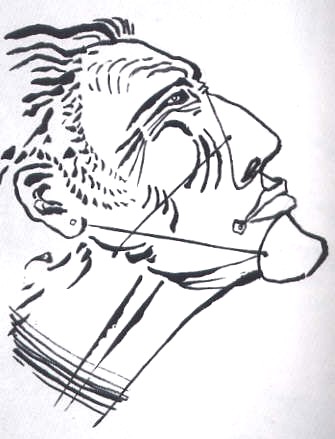
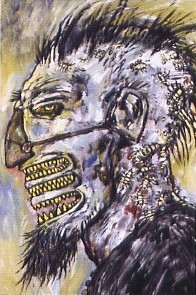
"One of things you get to do when you become a sub-creator like a writer of fantasies like this is you get to make your own laws.
Abarat is a place where I get to be law-giver and God - how great can this be!
"The idea that you get to create a world is wonderful and one of the things you can do is to give over to a sub-creator within that
world the business of then creating...The thing you allow is the chance of inverting what the laws are. We live in a world in which
the Christian mythology makes the creator male, and I get to play with that idea and, you know, many of the most powerful
people in my life have been women. Starting with my mother who is an Italian lady of great fierceness, my editors have always
been women, my agents have very often been women. My grandmother, who died at 101 two years ago, was again an Italian lady
who was the model for a character called Mater Motley in the Abarat books, who's basically a very bad lady.
"She's all over the second book. And, this is a completely true story, I was taught as a child a prayer my mother had created to
keep my grandmother at bay..! That makes a profound mark on a young psyche! So, when it came to creating some forceful
power of negation that would stand as a yin to this yang, as it were, it seemed inevitable that I should choose another female so
that if it really comes down to the fight (Quentin Tarantino thinks he did this first but he didn't, you know!) Mater Motley versus this
lady, Princess Breath, is going to be quite the thing. I mean, the idea of a woman breathing out life seems such a sweetly
effortless idea; that breathing is so simple an activity and that with every breath she makes new life and the wind that passes
through the islands carries the life into the sea and piece by piece, island by island, the islands are populated. I want to haunt
the audience a little... I very much want to have people come away with haunting images in their heads - the idea of a
goddess breathing out life seemed to be a good idea."
Barnes and Noble Stage Presentation
By Brein Lopez, LA Festival of Books, 25 April 2004
"It was definitely my active intention to bring a number of narrative lines full-circle and end some of the stories in the second book
so that we could then begin new, fun things for the third book and so that people wouldn't have that sense that really nothing was
going to get resolved until they'd read the Quartet. I wanted to really give readers a sense that some things get resolved; new
problems arise but there is resolution in the second book.
"It is [a high body count in Book Two] - and that was a very active decision. You know, I've got to clear the table a little bit because
I know there's a bunch of other people coming in here - waiting in the wings saying, 'Get off the fucking stage!' to the people who
are already there. And you're right, the body count is substantial, and that, as I say, was a very active decision on my part. I was
very excited to be able to do it. You can't do it in movies very often; in movies you very often have the sense of, 'Oh well...',
certainly in a monster movie, '...oh, they're going to come back.' Nobody's really dead and nobody really changes - you know,
Pinhead looks the same from movie to movie, Freddy Kreuger looks the same from movie to movie. I want physical change in the
characters I am showing to the audience, I want to watch Candy change as she moves through the islands and experiences things
and buys new kinds of clothes to wear, and the same with Malingo and other characters who appear on the page. I really tried to
develop their journeys a little bit."
In Anticipation Of The Deluge: A Moment At The River's Edge
By Phil and Sarah Stokes, 1 and 12 July 2004 (note - full text here)
"The second book of Abarat was, without question, the hardest book I have ever written. I threw away a whole version of the book,
in fact... and what's interesting is that almost nothing, nothing from that first version appears in the second, the definitive, second
book of Abarat which I am absolutely delighted by. I mean, I'm so pleased that I did make that choice; the second book is actually
now one of my favourite things that I've done - I'm really proud of it.
"It's very interesting this series - the problem of the series, the challenges of the series... One of the challenges is you have not
only to keep an audience up to speed with what's happened but you also have to lay plans for what's going to happen. One of the
things I like to be able to do is really give readers a chance to be able to make their own suppositions about the way the plot's
going to go; I try not to cheat readers. If readers were to look very closely at Books One and Two of The Abarat Quartet there would
be all kinds of clues they would be able to find as to how Books Three and Four will develop. So part of the challenge, really, is
being true to your audience's expectation and of course in the end you want each book that you do in the series to be a little better
than the one before, so, Book Two of the Abarat series is one hundred pages longer than Book One and we I think have something
like twenty-five or twenty-six oil paintings more than we had in the first book - so we have 125 oil paintings which is a massive
number of oil pictures, oil paintings for a single book. So it's really been quite an interesting challenge to put together this book.
"The climax is not a scene, it's a collection of scenes - I don't think I'm giving too much away when I say Days of
Magic, Nights of War contains a collision of worlds. The world in which Candy was brought up - Chickentown, (which is this boring
little town in Minnesota where nobody seems to care very much about anything), and the Abarat, (which of course is a world of
magic and transformation) - they're going to collide in the last hundred pages of the book. And the scenes that are connected with
that collision - the spectacle, the epic size of it! The first book was an introduction... well, in Book Two everything imaginable
starts to take place and everything gets much more spectacular, as I say, much more epic and I like writing that kind of stuff.
I like writing the apocalyptic stuff, so I'd have to say the last quarter of the book was a complete... I had a smile from ear to ear all the
time I was writing it!"
Interview
Audio interview by Anthony DiBlasi (i) Abarat 2 promotional CD ROM sampler, Joanna Cotler Books, June 2004 (ii) online at www.harpercollins.com
"I felt I had to go back and start again. There is nothing in the new version of book two which was contained in the old version of the book. So maybe that suggests that I did have more difficulty in entering into the world; maybe that was the problem. I was writing the second book on the heels of the first book. I didn't go off and write a screenplay; I ended book one and started book two. The third book will be an enormous book, and I know what's going to happen, or at least I know in broad strokes, and I know that's going to contain a lot of stuff which, in a weird way, I've been learning in the time since I finished the other book."
The Clive Barker Interview
By Brett Alexander Savory, IROSF.com, Vol I No 8, 21 August 2004 (note - full text at www.irosf.com)
...other comments
..."What's the Skein?" Candy said, becoming a little more interested now.
"I quote: 'It is the thread that joins all things - living and dead, sentient and unthinking - to all other things -'"
Now Candy was interested. She came to stand beside Malingo, looking at the Almenak over his shoulder. He went
on reading aloud.
"'According to the persuasive Miss Hap, the thread originates in the Vault at Huffaker, appearing
momentarily as a kind of flickering light before winding its way invisibly through the Abarat ... connecting us, one to another.'" He
closed the Almenak. "Don't you think we should see this?"
"Why not?"...
Elizabeth Devereaux: "Clive Barker's Abarat: Days of Magic, Nights of War like its predecessor, 'The Thief of Always,' trades
heavily on novelty. The author, best known for his adult horror fiction, has spent six years creating the paintings of the rococo
creatures used in the color illustrations, among them a villain with three jaws, stacked on top of one another, and a musician
with ''tendrils of spiraling matter'' growing out of his head and back. It's tempting to assume that the paintings preceded the often
picaresque plot, which follows young Candy Quackenbush from Chickentown, Minn., through the extravagant oddities of the Abarat
islands.
"By this second book Candy knows all too well that she will be essential to Abarat's future, and that the supremely evil Christopher
Carrion, Lord of Midnight, is out to get her. Barker gets big points for Candy, an unusually natural and winning heroine. Just think
'candid' and 'candor.' But she doesn't have worthy foes. Christopher Carrion and his henchmen come across as cruel yet
disappointingly gullible; they're always being betrayed by those to whom they pledge their loyalty, but no one ever wises up. So far
'Abarat' reads less like a series than one gigantic novel."
Fantasy Series: Of Trolls and Men
By Elizabeth Devereaux, New York Times, 14 November 2004
Jane Johnson (HarperCollins): "Clive and I have discussed for
the last six or seven years now how he might create a new world, a
world in which he could set a fantastic
epic to rival the worlds of Narnia, Middle-earth or Oz, an adventure
that would speak to the heart of modern readers, readers of all ages.
Arenas such as these offer writers and readers alike a unique
opportunity to exercise their imaginations, to explore the magical,
the heroic, the lost parts of our consciousness, rooted as they are in
the bones of human literature, in myth and legend, in the stories
humankind has told itself from the beginning of speech. That's why
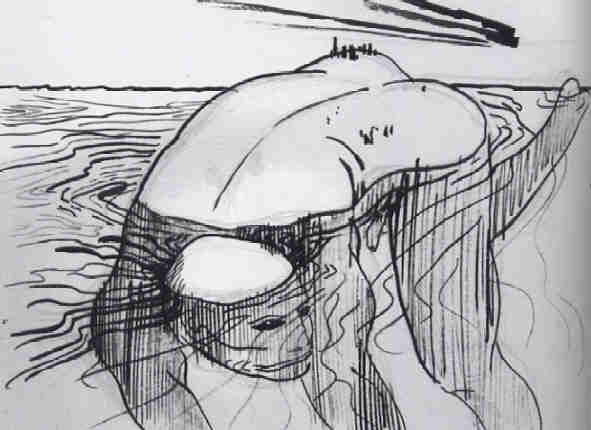
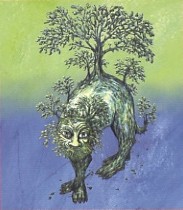 Tolkien's Lord of the Rings was voted in many polls as the public's
favourite book of the 20th century. And it's why the Harry Potter
books have been so universally popular.
Tolkien's Lord of the Rings was voted in many polls as the public's
favourite book of the 20th century. And it's why the Harry Potter
books have been so universally popular.
"I've been watching the paintings
for Abarat evolve over the last four years, and they are just amazing:
vivid, kaleidoscopic, breath-taking, funny, bizarre, inspiring.
'Abarat' - in all its various forms - as book, movie, interactive
experience - will be both magical and visually stunning. We all need
some magic in our lives; and the combination of Barker and
HarperCollins and Disney is going to be just perfect for delivering
that magic."
First Major Hollywood Deal Inspired By Oil Paintings
HarperCollins press release, April 2000
Jennifer Hubert : "The eagerly anticipated second volume of Clive Barker's four part fantasy series, Abarat: Days of Magic, Nights of War, picks up right where the highly praised first novel leaves off. Candy Quakenbush is still on the run from the Lord of Midnight, Christopher Carrion, who plans to establish a Permanent Midnight throughout the 25 islands that make up Abarat. Candy, aided and abetted by a host of colorful new characters, including Malingo (the affable geshrat she rescued in Book One), continues to dodge Carrion's hired assassins, as forces gather on both sides of Day and Night to prepare for the inevitable war between the Hours. Days of Magic, Nights of War is a true series book--those who have not traveled to Abarat before will have a difficult time picking up the threads of Barker's complex mythical opus without having read the first installment. But teen readers who have been waiting breathlessly for Candy's return are rewarded with a stunning sequel that reveals her true identity at the novel's smashing climax. As in Abarat, Clive Barker's full-colored, organic illustrations of Abarat's inhabitants stalk and swim across the pages like a Stephen King-meets-Dr. Seuss circus. There seems to be no end to Barker's ever-expanding idiosyncratic vision, and for that, fantasy fans of all ages can be grateful."
Best Books of 2004: Top 50 Editors' Picks
By Jennifer Hubert, Amazon.com, November 2004
David Langford: "Barker places his stamp on this enterprise with a gallery of wonders, horrors and eccentrics. The Abarat
teems with weirdly-shaped life, most of it sympathetic. Even Carrion has flashes of fellow-feeling, though his appalling granny
seems beyond repentance.
"Strangely, despite frowning on racism, heightism, freakism and general monsterism, Barker shows a touch of insectism here.
Carrion's world-destroying hordes of noxious 'sacbrood' are insectile and therefore, it seems, irretrievably malign - a routine fantasy
attitude, but something you'd expect this author to subvert."
Review: Dark Lords And Darker Grannies...
By David Langford, SFX, No 123, November 2004
Barbara Davies: "Fortunately there is more to the 15 year-old girl from boring old Chickentown, Minnesota than meets the
eye, or Abarat would have been a short series indeed. Why does Candy feel she's been to Abarat before? And how is she able to
call up Words of Power in times of peril? Surprisingly, by the end of this book (which is only half way through the series after all)
we not only know the answers to these questions, but Candy has been back home... and Barker has also killed off several of his
major characters.
"Candy has only visited 12 of the 25 islands available so far, however, and Mater Motley, a more formidable and cruel foe than even
her ghastly grandson, is after her. And so fertile, inventive, often horrid but above all playful is Barker's invention (it's obvious why
Disney has picked up the rights to Abarat), we can be sure there are more adventures for Candy and her friends to come."
Days of Magic, Nights of War
By Barbara Davies, Starburst, No 318, January 2005
Abarat II bibliography
Abarat II portfolio



